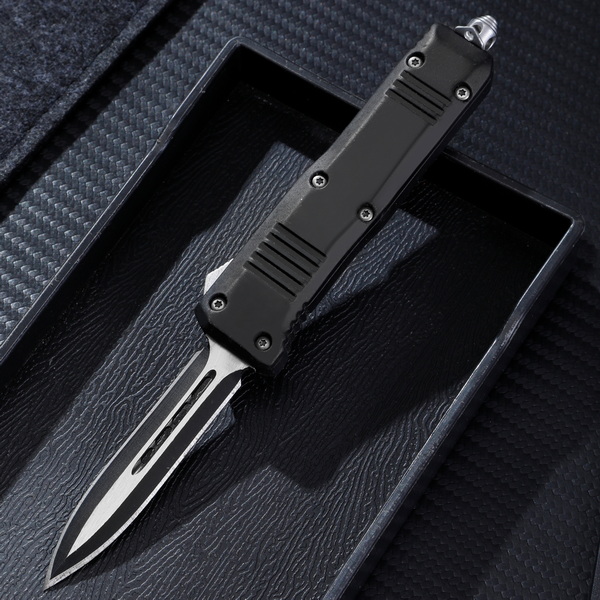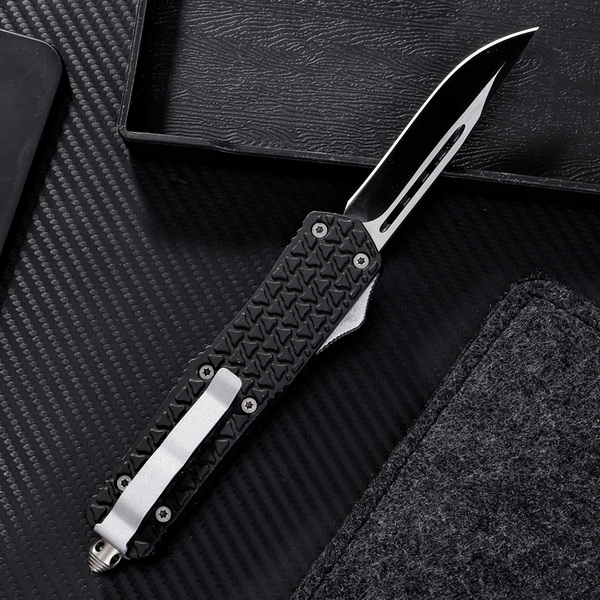Views: 222 Author: Loretta Publish Time: 2025-10-06 Origin: Site











Content Menu
● Legal Status of OTF Knives in Germany
● Legal Status of OTF Knives in the United States
● Legal Status in China and Other Countries
● Reasons for Heavy Regulation of OTF Knives
● Considerations for OEMs and Brand Owners
● FAQ
>> 1. Are OTF knives legal to own worldwide?
>> 2. Can I carry an OTF knife in public in Germany?
>> 3. What blade length is legal for OTF knives in the U.S.?
>> 4. Are OTF knives considered more dangerous than other knives?
>> 5. Are there shipping restrictions for OTF knives?
Out-the-front (OTF) knives—recognized for their unique blade deployment mechanism, which extends from the front of the handle—are a popular category of automatic knives used worldwide. Their rapid blade deployment and tactical appeal make them attractive to collectors, professionals, and enthusiasts alike. However, the legality of OTF knives is complex and varies significantly across different countries, influenced by concerns over public safety, historical precedent, and cultural attitudes toward knives. This article provides a comprehensive exploration of the legal status of OTF knives globally, with particular attention to regulations in Germany, the United States, China, and other regions, serving as an essential guide for manufacturers, wholesalers, and brand owners such as Yangjiang Ruizhen Industry and Trade Co., Ltd.

OTF knives are automatic folding knives where the blade extends and retracts straight out of the front of the handle using a sliding mechanism or button. They come primarily in two types:
- Single-action OTF knives: The blade is deployed automatically, but retraction is manual.
- Double-action OTF knives: The blade is both deployed and retracted automatically by a single control.
This mechanism allows for swift blade deployment, making OTF knives favored in tactical, emergency, and self-defense contexts. However, their fast operation and concealability also place them under tight legal scrutiny.
Germany enforces strict regulations on OTF knives, classifying them under "switchblade" laws as outlined in the German Weapons Act. The possession and carrying of OTF knives are heavily controlled due to their perceived danger and historic association with criminal activity.
- Prohibited blades: OTF knives with blades sharpened on both sides (double-edged) or blades longer than 8.5 cm are fundamentally banned.
- Legal exceptions: Single-edged OTF knives with blades shorter than 8.5 cm may be legally possessed but with some serious restrictions on carry.
- Carrying restrictions: Carrying OTF knives in public places is generally forbidden unless there is a legitimate reason, such as professional use in rescue services, fishing, or hunting.
- Transport: Transport in a locked container (such as a bag or suitcase) is allowed to avoid legal infringement.
- Possession at home: Owning and keeping OTF knives at home or private property is permitted within the legal blade specifications.
- Penalties: Violations of the law regarding OTF knives may lead to fines or imprisonment up to three years.
The rationale behind such regulations includes the rapid deployment mechanism of OTF knives, their historical portrayal as gang weapons, and overarching public safety concerns. German law treats these knives as potential threats in public spaces, aiming to minimize violent confrontations where such knives could be used impulsively or maliciously. The law also aims to prevent the abuse of easily concealed, mechanically operated knives.
In the United States, federal law—the Switchblade Act of 1958—prohibits the manufacture, importation, and interstate commerce of switchblade knives, which includes OTF knives. However, federal law leaves the regulation of possession and carrying to individual states. This results in a patchwork of laws with diverse restrictions:
- Permissive states: States like Texas, Arizona, Florida, and Georgia allow possession and open or concealed carry of OTF knives, typically without blade length restrictions.
- Restricted states: California, New York, Massachusetts, and others impose strict length limits (commonly 2-3 inches), or outright bans on owning or carrying OTF knives.
- Local ordinances: Some cities implement further restrictions, though state law often supersedes them.
- Shipping: Federal law prohibits shipping switchblades via USPS, but commercial carriers such as FedEx and UPS can legally transport them within regulatory guidelines.
- Usage and carry: Laws concerning where OTF knives can be carried—public spaces, schools, government buildings—vary greatly and often require permits.
This complex legal landscape necessitates careful compliance for manufacturers, sellers, and consumers to avoid unintentional legal violations. Knowing the specific requirements for each state is essential when distributing or owning OTF knives in the U.S.

China's knife laws focus heavily on public safety and control over dangerous weapons, which includes OTF knives under certain conditions:
- Knife sales are closely regulated, especially for automatic and spring-assisted knives.
- Purchase and possession may require registration or permits in particular regions.
- Possession of OTF knives in sensitive zones or during major public events is often prohibited.
In other parts of the world:
- Hong Kong: OTF knives are classified as prohibited weapons; possession invites severe penalties.
- France: Classified as Category D weapons, automatic knives like OTFs are subject to strict possession and carrying regulations, with severe penalties for violations.
- The Netherlands: Owning OTF knives is often restricted, but certain folding knives with single-handed opening are permitted under conditions.
- Switzerland: Switchblades are banned, and carrying knives with blades longer than specified lengths is regulated.
- United Kingdom: There is a blanket ban on automatic OTF knives, aligning with laws that are strict even on simple folding knives, creating one of the most restrictive environments.
Countries like the Czech Republic offer more lenient legislation, allowing possession without many restrictions. Each jurisdiction reflects its own balance between public safety and individual rights related to knife ownership.
The legal restrictions placed on OTF knives stem from various interrelated concerns:
1. Rapid deployment and danger: The swift blade deployment makes them more prone to sudden use in confrontational situations.
2. Public safety: Laws seek to prevent violent assaults and criminal use by limiting access and carry.
3. Criminal associations: Historical imagery ties switchblades, including OTF knives, with gangs and street violence, influencing lawmaking.
4. Concealability and abuse potential: Their compact, easily hidden form means they can be carried undetected and misused.
5. Controlling weapon access: Authorities regulate OTF knives alongside other weapons like firearms to restrict dangerous tools in civilian hands.
6. Limited practical use: Compared to fixed blades or manual folding knives, OTF knives are seen as less necessary for everyday tasks and more as “combat knives,” reinforcing restrictive views.
For companies such as Yangjiang Ruizhen Industry and Trade Co., Ltd., which provide OEM services for international brands and wholesalers, understanding these laws is crucial for compliance and market success:
- Design OTF knives within legal blade length and edge type parameters for target markets.
- Ensure export and import compliance, especially regarding countries with strict shipping or possession laws.
- Provide clear usage and carry guidelines to clients to reduce legal risks.
- Avoid marketing that promotes OTF knives as weapons or tools for illegal purposes.
- Stay abreast of evolving knife laws, as some regions are actively revising regulations.
OTF knives constitute a legally sensitive category of automatic knives worldwide. Their legal acceptance ranges from complete prohibition in countries such as Germany and the United Kingdom to conditional legality in diverse American states and parts of Asia. The regulatory frameworks reflect serious concerns about public safety, criminal misuse, and the nature of OTF knives as swiftly deployable weapons. Manufacturers, wholesalers, and consumers must carefully navigate these complex legal landscapes to ensure compliance and responsible ownership. Awareness of regional differences, anticipating regulatory changes, and adopting lawful design and marketing practices will safeguard business operations and enhance market trust in OTF knife products.

No. The legality of owning OTF knives varies widely between countries and within jurisdictions. Some nations ban them outright, while others permit possession with specific conditions such as blade length or purpose of use.
Generally no. OTF knives that comply with legal blade length and edge criteria cannot be carried in public without a legitimate reason, such as professional use or transport in a locked container.
Blade length limits vary by state. Many states allow blades between 2.5 to 4 inches, but some states fully ban OTF knives regardless of size.
Due to their rapid deployment mechanism and concealability, OTF knives are often viewed as potentially more dangerous, which justifies heavier regulations in many regions.
Yes. For example, in the U.S., switchblades cannot be shipped through postal services but can be transported via commercial couriers under strict regulations.
[1](https://knyfe.de/en/2024/10/96/otf-knife-everything-about-the-legal-situation-in-Germany/)
[2](https://www.tektoknives.com/blogs/news/crazy-knife-laws-around-the-world)
[3](https://bpsknives.com/knife-laws-around-the-world-what-you-need-to-know/)
[4](https://knife-blog.com/german-knife-law/)
[5](https://en.wikipedia.org/wiki/Knife_legislation)
[6](https://steelriverknives.com/world-wide-switchblade-laws/)
[7](https://www.reddit.com/r/Netherlands/comments/1c1b4p9/are_otf_knives_illegal_to_own_in_the_netherlands/)
[8](https://bigredknives.com/blogs/knife-know-how/the-world-of-knife-laws-a-guide-to-possession-carrying-and-use-regulations-by-country)
[9](https://www.koiknives.com/blogs/japanese-knives/knife-laws-around-the-world-from-carrying-a-sword-in-public-to-owning-a-switchblade)
How to Verify Authenticity and Quality in Automatic OTF Knife Purchases
Choosing an Automatic OTF Knife for Tactical vs Everyday Use
The Benefits of Same-Day Shipping When Ordering Automatic OTF Knives
What Sets Premium Automatic OTF Knives Apart From Budget Alternatives
How to Maintain Peak Performance of Your Automatic OTF Knife
What Consumers Should Know About Automatic OTF Knife Blade Deployment
Customization Options in Automatic OTF Knives: OEM and ODM Explained